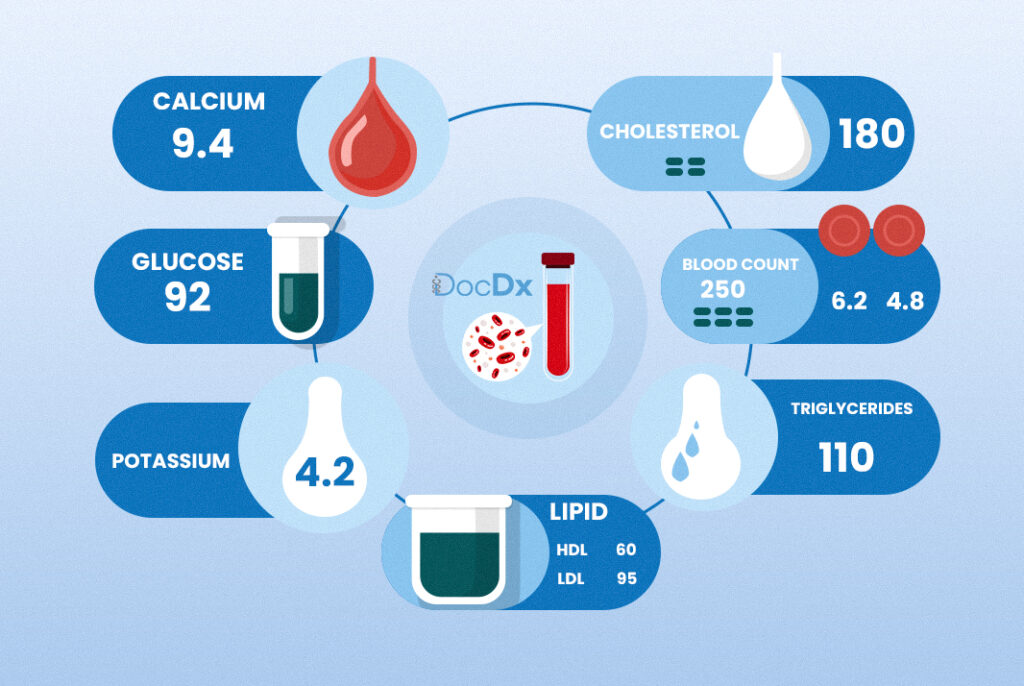Ever stared at your lab results and felt like you were reading a foreign language? You’re not alone. Blood tests play a massive role in understanding what’s going on inside your body, but interpreting them can feel overwhelming. Don’t worry—we’re breaking it all down in plain language so you can feel confident about your health choices.
The Basics of Blood Testing
What is a blood test?
A blood test is a lab analysis of a blood sample used to evaluate your overall health or diagnose certain conditions. It’s often the first step your doctor takes to peek under the hood, so to speak.
When are blood tests usually ordered?
They’re common during annual physicals, before surgeries, or when you’re experiencing symptoms like fatigue, unexplained weight loss, or inflammation. In short, they’re one of the most powerful tools in modern medicine.
Where to get reliable lab work
If you’re in need of trusted laboratory testing, DocDx offers comprehensive diagnostics that are timely, accurate, and accessible.
Key Blood Tests and What They Reveal
Complete Blood Count (CBC)
The CBC checks the cells in your blood—white cells, red cells, and platelets.
What it checks
- White blood cells: Immune response
- Red blood cells: Oxygen transport
- Platelets: Blood clotting
Normal ranges and meanings
Too few red blood cells? It could indicate anemia. High white blood cell count? That might signal an infection.
Basic Metabolic Panel (BMP)
Focuses on your body’s chemical balance.
What it checks
- Glucose levels (important for diabetes)
- Calcium
- Electrolytes like sodium and potassium
Comprehensive Metabolic Panel (CMP)
This test includes everything in a BMP plus liver and kidney function markers—essential in spotting early signs of organ issues.
Lipid Panel
Cholesterol is a silent risk, and this test helps monitor it.
What it checks
- HDL (good cholesterol)
- LDL (bad cholesterol)
- Triglycerides
Thyroid Function Test
When your energy levels feel off, thyroid hormones may be to blame.
What it checks
- TSH, T3, and T4 levels help determine if your thyroid is overactive or underperforming.
The Role of Blood Tests in Preventive Care
Catching issues early
Blood tests can reveal early signs of diabetes, liver dysfunction, high cholesterol, and more. Staying ahead of problems is always better than treating them later.
Part of your annual check-up
As part of routine physical exams in Maryland, blood work gives your provider key insights into your health.
Preventive health strategies
According to the article ‘The Role of Blood Work in Preventive Health Care‘ , regular blood work is critical for mapping a long-term health plan.
Interpreting Your Lab Results
Understanding lab reports
Lab reports usually include:
- The test name
- Your result
- Reference range
- Notes on abnormalities
What’s considered “normal”?
Reference ranges vary slightly, but your doctor interprets them based on your age, sex, and medical history. A slight variation doesn’t always mean something serious.
Don’t panic at the first glance
Seeing something flagged as “high” or “low” isn’t always a reason to worry. It often depends on patterns and overall trends.
Blood Work Before Surgery
Why it’s essential
Before any surgery, your doctor needs to make sure your body is ready. Blood tests check for anemia, infection, or clotting issues.
What tests are included?
Common pre-op blood work includes:
- CBC
- Coagulation tests
- Electrolyte panels
Read more about pre-surgery blood tests here.
Following Up After Lab Tests
What if something’s off?
Don’t jump to conclusions. Instead, schedule a follow-up with your provider and consider additional diagnostics through DocDx’s medical diagnostic service.
Work with your primary care provider
Strong communication is key. Your doctor will help you understand what the numbers mean and what to do next.
The Rise of Telemedicine and Lab Testing
A new way to manage health
Lab work and virtual care go hand-in-hand. You can now consult with a provider, receive lab orders, and get results—all online.
Regulations matter
Stay informed about telemedicine regulations to ensure your care is compliant and secure.
How DocDx Supports Your Health Journey
Full-service primary care
From blood tests to annual check-ups, DocDx offers complete primary care services to help you stay on track.
One-stop convenience
With lab work, diagnostics, and follow-ups all under one roof, managing your health has never been easier.
Conclusion
Blood test results don’t have to be intimidating. With a little knowledge, you can understand what your numbers mean and use that insight to stay healthy. Regular blood work is a vital part of any wellness strategy, and trusted providers like DocDx make it easy to stay informed and in control.




